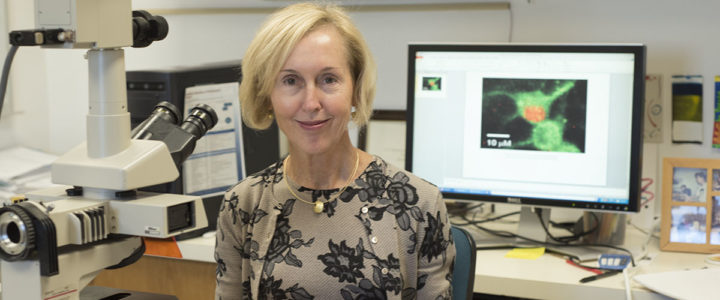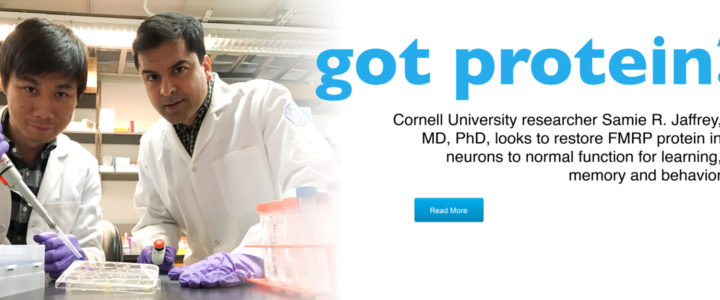The 18th International Fragile X and Related Neurodevelopmental Disorders Workshop in Quebec, Canada, was a great success, featuring Fragile X much more heavily than any previous meeting in this series! We asked our speakers to summarize their work in their own words, with brief updates from researchers investigating Fragile X.
Read moreNIH
Autophagy is a Novel Therapeutic Target of Impaired Cognition in Fragile X Syndrome

Dr. Suzanne Zukin, at Albert Einstein College of Medicine, is expert on signaling pathways in the brain and the regulation of synaptic plasticity. With this 2017 grant of $90,000 from FRAXA Research Foundation, she and her team are exploring autophagy, which is how cells clean house, in Fragile X.
Read moreTargeted Transcriptional Reactivation of FMR1 in Fragile X Syndrome Stem Cells

With a $90,000 grant from FRAXA Research Foundation awarded in 2016, University of Michigan researcher Peter Todd, MD, PhD, is using CRISPR to selectively turn the Fragile X gene back on in stem cells.
Read moreDefining Subcellular Specificity of Metabotropic Glutamate Receptor (mGluR5) Antagonists

With $217,500 in grants from FRAXA Research Foundation, Dr. Karen O’Malley and team studied the function of mGluR5 when it is inside cells. Many of the symptoms of Fragile X Syndrome (FXS) are thought to arise due to overactive metabotropic glutamate receptor 5 (mGluR5) signaling, which is normally opposed by the protein missing in FXS, Fragile X Protein (FMRP).
Read moreMechanisms of Tolerance to Chronic mGluR5 Inhibition

Over the past few years, both Novartis and Roche sponsored large-scale clinical trials of metabotropic glutamate receptor 5 (mGlu5) negative allosteric modulators (NAMs) to treat Fragile X syndrome (FXS). With a $90,000 grant from FRAXA Research Foundation in 2015-2017, Dr. Mark Bear’s team will explore if mGlu5 NAMs dosed chronically causes tolerance, and if so, how it develops and to probe new avenues to prevent or circumvent it.
Read morePrefrontal Cortex Network (PFC) Dynamics in Fragile X Syndrome

With a $90,000 grant from FRAXA Research Foundation from 2016-2017, Dr. Daniel Johnston and Dr. Jenni Siegel at the University of Texas at Austin are analyzing pre-frontal cortex (PFC) dysfunction in the Fragile X model. They have preliminary evidence that Fragile X mice are severely impaired in a prefrontal cortex (PFC)-dependent task.
Read moreDevelopment of a High-Content Synapse Assay to Screen Therapeutics for Fragile X Syndrome

With a $45,000 grant from FRAXA Research Foundation in 2009, Dr. Mark Bear and Dr. Asha Bhakar used High Content Screening (HCS) to develop an assay sensitive to the effect of the FXS genotype. This project was funded in full by NIH after the first year.
Read moreBiomarker Discovery and Validation for Fragile X Syndrome

With a $120,000 grant from FRAXA Research Foundation over 2015-2016, Dr. Eric Klann of New York University investigated potential new biomarkers in Fragile X syndrome and how to translate these markers from mouse models to human patients.
Read moreRepurposing Available Drugs to Treat Fragile X Syndrome – FRAXA Initiatives

FRAXA Research Foundation was founded in 1994 to fund biomedical research aimed at finding a cure for Fragile X syndrome and, ultimately, autism. We prioritize translational research with the potential to lead to improved treatments for Fragile X in the near term. Our early efforts involved supporting a great deal of basic neuroscience to understand the cause of Fragile X. By 1996, these efforts had already begun to yield results useful for drug repurposing. To date, FRAXA has funded well over $25 million in research, with over $3 million of that for repurposing existing drugs for Fragile X.
Read morePIKE as a Central Regulator of Synaptic Dysfunction in Fragile X Syndrome

With $255,000 from FRAXA Research Foundation, Dr. Suzanne Zukin at Albert Einstein College of Medicine studied signalling pathways in Fragile X syndrome.
Read moreNIH Investigator Carolyn Beebe Smith, PhD, Looks to Improve Sleep in Fragile X Syndrome

Our sons with Fragile X Syndrome typically go to bed early and rise early. Sometimes they jump on us while we are sleeping at 3 a.m., excited to start their day. For heaven’s sake, why? The answer may come from Carolyn Beebe Smith, PhD, senior investigator, Section on Neuroadaptation and Protein Metabolism, National Institute of Mental Health, National Institutes of Health, Bethesda, Maryland. She is studying why children, in particularly boys, with FXS have problems sleeping.
Read moreNew Fragile X Clinical Trial for Children Launching in June 2017

Rush University Medical Center Professor Elizabeth M. Berry-Kravis, MD, PhD, has launched and is recruiting participants for a large-scale clinical trial to study effects of AFQ056, an mGluR5 blocker, on learning in young children.
Read moreCorrecting Defects in Astrocyte Signaling in Fragile X Syndrome

With a $90,000 grant from the FRAXA Research Foundation from 2015-2016, Dr. Laurie Doering and Dr. Angela Scott at McMasters University studied astrocytes in Fragile X. Astrocytes, brain cells which support neurons, do not transmit signals. Several treatment strategies for Fragile X have been proposed based on correction of “astrocyte phenotypes”.
Read moreSensory Hypersensibility in Fragile X Syndrome and BK Channel Openers

With $366,100 in grants from FRAXA Research Foundation, these investigators at the University of Orleans studied sensory abnormalities in Fragile X mice and test the ability of a class of drugs, BK channel openers, to rescue these abnormalities.
Read moreRepurposing Drugs to Dampen Hyperactive Nonsense-Mediated Decay in Fragile X Syndrome

With a $90,000 grant from the FRAXA Research Foundation, Dr. Lynne Maquat and Dr. Tatsuaki Kurosaki will investigate nonsense-mediated mRNA decay (NMD) in Fragile X. NMD is a “housekeeping” process that cells use to prevent faulty proteins from being made. But there is too much of it in Fragile X syndrome. There are already available drugs that suppress NMD – including caffeine.
Read moreKimberly Huber, PhD, Explores Hyperexcitability in Fragile X Syndrome

Ever wonder why your child with Fragile X suddenly screams for no apparent reason or jumps and flaps uncontrollably seemingly for hours? You got it: hyperexcitability. But what exactly causes it? And what can fix it? Kimberly Huber, PhD, is working long and hard in her lab to answer those questions. Dr. Huber, professor, Neuroscience, UT Southwestern Medical Center, is seeking to understand how FMRP regulates connections between brain cells, called synapses, and the function of brain circuits, which are several connected brain cells.
Read moreAltered Sleep in Fragile X Syndrome: Basis for a Potential Therapeutic Target

With a $90,000 grant from FRAXA Research Foundation over 2016-2018, Dr. Carolyn B. Smith and Dr. Rache Sare at the National Institute of Mental Health investigated the basis of sleep problems in Fragile X syndrome.
Read moreCornell University Researcher Looks to Restore Fragile X Protein in Neurons

Which is the right FMRP for therapeutic development of Fragile X syndrome? When researchers develop effective drugs that reactivate FMRP — the protein that is normally silenced in Fragile X — what in the world will they do next? So ponders Cornell University researcher Samie R. Jaffrey, MD, PhD. Jaffrey, professor, Pharmacology, Weill Cornell Medical College, Cornell University, knows reactivating FMRP will lead to many important questions, such as: Which cell type needs FMRP? How much FMRP protein is needed to restore brain function? Where in the brain will FMRP protein be needed? Where in a neuron will the FMRP needs to be expressed?
Read moreResearcher David Nelson, PhD, Explores New Cell Strategies for Fragile X Syndrome, FXTAS and FXPOI

It’s rare to find a researcher working on the Big Three — Fragile X Syndrome (FXS), Fragile X-associated Tremor/Ataxia Syndrome (FXTAS) and Fragile X-associated primary ovarian insufficiency (FXPOI). Then again, David Nelson, PhD, is the rare bird. Nelson is a professor of Molecular and Human Genetics, Baylor College of Medicine, and director of Baylor’s Graduate Program in Integrative Molecular and Biomedical Sciences. He has been involved in FXS research since the late 1980s where he helped identify the mutation and the FMR1 gene. These days, researchers in Nelson’s lab at Baylor are studying FXS, FXTAS and FXPOI using mouse models.
Read moreThe X Factor – Turning on X Chromosome Genes to Treat X-linked Disorders

Harvard researcher Jeannie T. Lee, MD, PhD, moves closer to turning on select genes on the X chromosome to treat people with X-linked disorders.
Read moreFragile X Fruit Fly Research Bears Fruit

A new FRAXA-funded study shows how the hormone insulin – usually associated with diabetes — is involved in the daily activity patterns and learning deficits in the fruit fly model of Fragile X Syndrome (FXS). The study also reveal a metabolic pathway that can be targeted by new and already approved drugs to treat Fragile X patients, notably metformin.
Read moreFragile X Cure One Step Closer with FRAXA Support of $1 Million in New Research

4 Countries – 10 Teams – $1 Million for finding new treatment targets, to pinpointing outcome measures for future clinical trials, to attempting to reactivate the gene which is silenced in Fragile X syndrome, these innovative scientists will bring us closer to a cure.
Read moreAbnormalities of Synaptic Plasticity in the Fragile X Amygdala

With a $110,050 grant from FRAXA Research Foundation from 2005-2016, Dr. Sumantra Chattarji at the National Center for Biological Sciences researched how the amygdala is affected by Fragile X syndrome. Results published.
Read moreNeuren’s Tofinetide Successful in Phase 2 Clinical Trial in Fragile X

We are pleased to share great news adapted from Neuren’s press release: Neuren’s phase 2 trial has successfully established proof of concept and provides a strong rationale for Neuren to move forward with developing trofinetide for Fragile X syndrome. In this initial small trial with a relatively short treatment period, trofinetide was very well tolerated, with the high dose (70 mg/kg twice daily) demonstrating a consistent pattern of clinical improvement, observed in both clinician and caregiver assessments.
Read moreFRAXADev – Developing BK Channel Openers for Fragile X Syndrome

A number of people have asked us about FRAXADev, a new project starting in France; this is a nonprofit initiative which seeks to develop a new kind of drug for Fragile X. The drugs they are interested in testing in Fragile X clinical trials were developed by Bristol-Myers Squibb many years ago, and are now off patent. This class of drugs opens a potassium channel in the membrane of neurons, which helps to decrease neuronal excitability.
Read more
